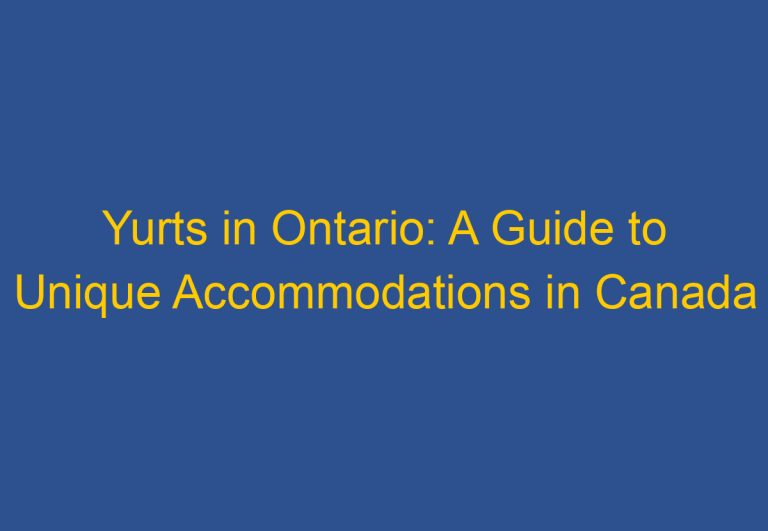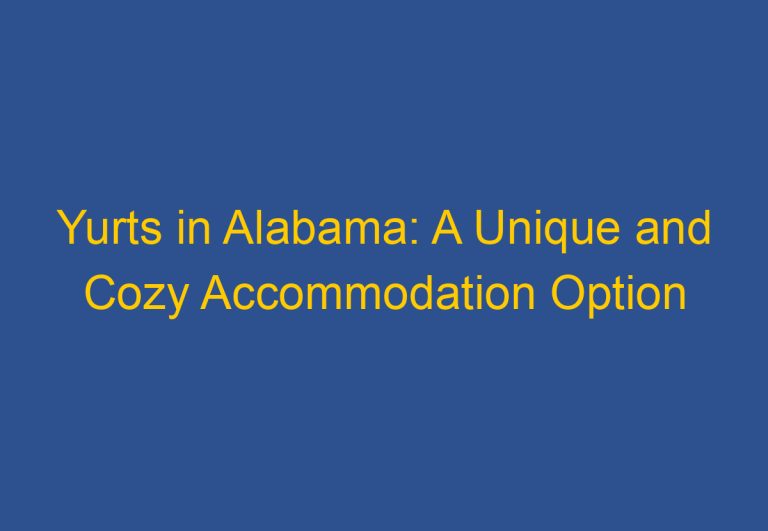Are Yurts Legal in Florida? A Comprehensive Guide to Yurt Living in the Sunshine State
Yurts have become increasingly popular as a unique and affordable housing option for those looking to live off the grid or simply downsize their living space. However, before investing in a yurt, it is important to know the legalities surrounding them in your area. This is especially true for those living in Florida, where building codes and regulations are strict due to the state’s vulnerability to hurricanes and other natural disasters.
According to Florida’s building code, yurts are allowed to be built as long as they meet certain requirements. These requirements include following the Florida Building Code, which ensures public safety and health during extreme weather conditions. It is important to note that these requirements may vary depending on the location within Florida, as different counties and cities may have their own zoning laws and regulations regarding yurts. Therefore, it is important to research the specific laws and regulations in your area before investing in a yurt.
Legality and Zoning for Yurts in Florida
Yurts are gaining popularity as a unique and affordable housing option. However, before setting up a yurt in Florida, it is important to understand the state and county building codes, permitting process, and zoning laws.
State and County Building Codes
Florida has a statewide building code that applies to all construction projects, including yurts. The Florida Building Code (FBC) sets minimum standards for construction, electrical, plumbing, and mechanical systems. Yurt construction must meet the requirements of the FBC, and local building departments may have additional requirements.
Permitting Process and Building Officials
To build a yurt in Florida, the permitting process must be followed. This process involves submitting plans and obtaining permits from the local building department. The building official will review the plans and ensure that they meet the requirements of the FBC and any local ordinances.
Zoning Laws and Land Use
Zoning laws and land use regulations vary by county in Florida. Some counties may not allow yurts as permanent dwellings, while others may require a special permit or variance. It is important to check with the county zoning department to determine the regulations for yurts in the area.
In rural areas, yurts may be classified as temporary structures, which have different zoning requirements than permanent structures. Additionally, yurts may be subject to regulations from the health department, such as requirements for septic systems or wells.
Overall, it is important to research the regulations and requirements for building a yurt in Florida before beginning the process. By following the proper procedures and obtaining the necessary permits and approvals, yurt living can be a unique and enjoyable experience.
Yurt Living and Construction Considerations
Structural Integrity and Weather Resistance
When considering living in a yurt in Florida, structural integrity and weather resistance are important factors to consider. Yurts are designed to withstand various weather conditions, including rain, wind, and snow. However, it is important to ensure that the yurt is constructed to meet the Florida Building Code, especially in areas prone to hurricanes and high wind speeds.
The yurt’s frame and cover should be made of sturdy and durable materials that can withstand the elements. The cover should also be properly insulated to maintain a comfortable temperature inside the yurt. The R-value of the insulation used should be appropriate for the local climate.
Utilities and Amenities for Comfortable Living
Living in a yurt does not mean sacrificing modern amenities. While off-grid living is possible, it is also possible to have access to utilities such as electricity, water, and sewage. Composting toilets or a septic system can be used for waste management.
To ensure comfortable living, a yurt can be equipped with a full kitchen, outdoor shower, lighting, and even a coffee maker. Heating can be provided by wood stoves or other heating systems.
Environmental Impact and Outdoor Activities
Living in a yurt can have a lower environmental impact compared to traditional homes. The smaller footprint of a yurt means less energy is required for heating and cooling. Additionally, yurts can be constructed without disturbing the natural environment.
Outdoor activities such as hiking, fishing, kayaking, and canoeing can be easily accessed from a yurt. Many yurt campgrounds are located near beaches and other outdoor attractions.
Overall, living in a yurt in Florida requires careful consideration of construction, utilities, and amenities. However, the benefits of a lower environmental impact and easy access to outdoor activities can make it a desirable option for those seeking a unique and sustainable living experience.
Frequently Asked Questions
What are the zoning regulations for erecting a yurt in Florida?
Zoning laws and regulations vary by city and county in Florida, so it’s important to research local laws and regulations to determine if living in a yurt is allowed. In general, yurts may be considered temporary structures and may not be permitted as permanent residences in some areas. It’s important to consult with local authorities before erecting a yurt to ensure compliance with zoning regulations.
Can yurts be used as permanent residences in Florida?
Whether yurts can be used as permanent residences in Florida may depend on the zoning regulations in the area. In some cases, yurts may be considered temporary structures and may not be permitted as permanent residences. However, there are instances where yurts have been approved as permanent residences in Florida.
Are there specific building codes for yurts in Florida?
There are no specific building codes for yurts in Florida. However, yurts must meet the same building codes and regulations as other structures in the area, such as those related to electrical, plumbing, and fire safety.
Is it possible to rent a yurt in Florida and what are the legal requirements?
Yes, it is possible to rent a yurt in Florida. However, the legal requirements for renting a yurt may vary by location. It’s important to research local laws and regulations to ensure compliance with any licensing or permitting requirements.
Which Florida state parks offer yurts for accommodation?
Several Florida state parks offer yurts for accommodation, including O’Leno State Park, Hillsborough River State Park, and Anastasia State Park. It’s important to check availability and make reservations in advance.
What should one consider when purchasing a yurt from builders in Florida?
When purchasing a yurt from builders in Florida, it’s important to consider factors such as the quality of materials used, the reputation of the builder, and the warranty or guarantee offered. It’s also important to ensure that the yurt meets any local zoning and building code requirements.












